|
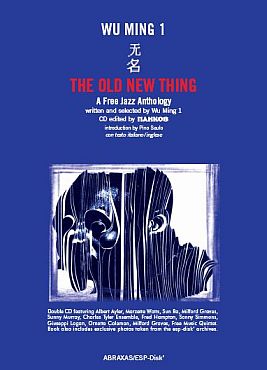
The Old New Thing is Newer than Ever
Wu Ming 1's Liner Notes for The Old New Thing: A Free Jazz Anthology, Abraxas/Esp-Disk, 2007
A double cd featuring Albert Ayler, Marzette Watts, Sun Ra,
Milford Graves, Sunny Murray,
Charles Tyler, Sonny Simmons,
Giuseppi Logan, Ornette Coleman, Free Music Quintet.
Music selected by Wu Ming 1 and edited by Pankow.
Dedicated to Richard Pryor and Stanley "Tookie" Williams, RIP
1. "Black music" -- i.e. the musical chain reaction triggered by the African Diaspora -- is a landscape of the mind, a whole continent which is neither Africa nor America, nor Europe. It's a continent drifting out on an ocean of stories, a colossal barge transporting forests, deserts, uplands, isles at the centre of vast lakes, snow-covered mountain ranges.
We Europeans know "well enough" -- actually we think we know - - African North-American music (including tiny bits of the Caribbean), but that is a small province, and we explored it only partially. Meanwhile, the great African Brazil takes you by surprise when new rhytms burst out of the modern quilombos, sharp beats swoop down and you find yourself defenseless, they cut like razors, deep bass drones take you from behind, deviant funk melts the soles of your boots. Not to mention what happens when the music of the Diaspora lands back on the old motherland, only to take off again: Afro-beat, Afro-soul, James Brown drawing inspiration from Fela Kuti drawing inspiration from James Brown, Hip-Hop made by Senegalese B-Boys in Paris or Dakar, jazz tunes played with koras on the edge of the desert.
Yeah, "jazz". A word meaning everything and nothing, both loved and rejected, a polisemic storm, micro-explosions under your nails while you're digging the earth to find your roots. Nowadays jazz is "unidentified musical energy". I'm going to use the term in this text 'cause it's practical. By "jazz" I mean all music sharing Afro-American origins and partially or totally based on improvisation.
How many people think they know jazz, and they're wrong? How many guys, among the fans of Black music, associate the word "jazz" with a bourgeois milieu and a set of cozy images? In many cities, jazz is the nostalgic rehash you pretend to listen to in posh clubs. The most important experiment in the past few years was taking jazz into squats and social centres.
In this year of the Lord 2006, a B-Boy or B-Gal from the 'hood (in Bologna or Manila, in La Paz or Nairobi) is unaware of how much the music she loves owes to jazz. She only knows some backwoods, streams and meadows, the mental map of a limited area of music. She'd get so excited if she could feel the rolling of the continental barge under her feet, sail the great seas, cruise the Cape of Good Hope. She would see everything with new eyes, like Bartolomeo Diaz or Vasco de Gama.
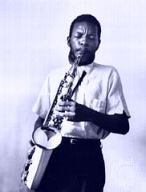 2. The exploration could start from Free Jazz. Why? What can the old "New Thing" tell us nowadays? It caused a sensation half a century ago, but yesterday's scandals are today's boredom, the notion of "scandal" itself is a cliché, who gives a damn? 2. The exploration could start from Free Jazz. Why? What can the old "New Thing" tell us nowadays? It caused a sensation half a century ago, but yesterday's scandals are today's boredom, the notion of "scandal" itself is a cliché, who gives a damn?
On the contrary, that music speaks to "us", "here", "today", and talks about "us", "wherever we'll be", "tomorrow". Many people think that Free Jazz had no heirs. Actually, it influenced everything that followed.
Free jazz was born at the end of 1950's, thanks to such musicians as Cecil Taylor and Ornette Coleman. That early Free Jazz, when we hear it today, doesn't sound that much radical, but at that time it was considered heresy - cacophonic, dissonant, "out of tune" heresy. In the 1960's musicians got more radical, their output sounds extreme even today. Albert Ayler. Archie Shepp. John Coltrane's final albums. "Trane", a veteran of hard-bop and modal jazz, entered the field and ran faster than anyone else, he went further on, beyond his peers, even beyond the posterity. He still leaves us flabber-gasted. Ascension, Live in Japan, and then the peak, the cusp: The Olatunji Concert. Music that exceeded the world of notes, music whose sound anticipated noize rock, death metal, grindcore, nu metal... In that record, Trane's sax "scrapes" like the voice of Slipknot's Corey Taylor and other singers in that scene. What? You think it's just a quip? Well, think it over. Once an interviewer asked James Brown what's the difference between blues, soul, funk and jazz. He answered there was none. That's also a quip, but the meaning is: stockades and fences don't help us get the message.
There is no straight line of heritage from those sonic attacks and today's ones, but there's kinship, there are collateral relationships. Bones match, some evolution is visible. The missing link must be sought in Punk Rock and its whereabouts: the furious jam in the Velvet Underground's Sister Ray; the second side of the Stooges' Funhouse, with Steve McKay's sax completely out of control; the cover of Sun Ra's Starship at the end of MC5's Kick Out The Jams. An article by Lester Bangs written in 1979 - not included in neither of the two collections of his writings - was called "Free Jazz / Punk Rock" and was precisely about this, it mentioned Contortions, PIL and Pere Ubu as well, plus such "intermediaries" as Zappa and Beefheart.
We're underground, dozens of yards beneath the road. That's where Free Jazz sowed its seeds. Plants have grown out of the cracks in the asphalt, sometimes they don't resemble jazz in the slightest, you have to look at them (listen to them) very carefully. Think of 1970's electric jazz, "jazz-rock"... Those old militant critics - e.g. Valerie Wilmer or Frank Kofsky - would deny this with all their strength, Miles Davis himself would deny it, and yet if you listen to On the Corner or Bitches Brew, stuff that was described as widely diverging from the path of Free Jazz, well, you can hear the "new thing", you can hear it in there. Now we can judge things with detachment, in their historical perspective. We understand that, without the Free Jazz revolt, those albums wouldn't even have existed. Same thing can be said about Herbie Hancock's records, e.g. Sextant or Crossings. The lesson of the "new thing" was assimilated, changed, some would say "perverted", anyway, it's there. And you can hear the "new thing" also in the music of Parliament/Funkadelic, which were glaringly affected by Sun Ra and the Art Ensemble of Chicago.
Would Hip-Hop exist without those names populating its Neolithic, Miles Davis, Herbie Hancock, George Clinton...? The virus of Free Jazz was passed on to Hip-Hop by "healthy carriers". Breakbeats get ever more crooked and syncopated, the sound is loaded with dissonance, freestylin' goes wild. The old "new thing" is newer than ever.
But why did Free Jazz have no direct descent? How come it bred only mutants? All in due time.
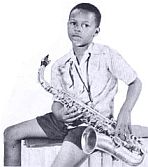 3. As a matter of fact, the music which slanderers described as "inarticulate" and "amateurish" was highly structured, Georges Perec wrote about that, and somebody else - maybe in the liner notes of New Thing At Newport - described Coltrane's music as "structure upon structure upon structure". 3. As a matter of fact, the music which slanderers described as "inarticulate" and "amateurish" was highly structured, Georges Perec wrote about that, and somebody else - maybe in the liner notes of New Thing At Newport - described Coltrane's music as "structure upon structure upon structure".
Free jazz was not uprooted, abstract innovation: it stood on the pedestal of African American tradition, its feet were roots plunged in fertile soil. This is the most interesting aspect: a non-traditionalistic approach to tradition. This challenge is still valid, now more than ever we need an approach that would be neither subservient nor completely arbitrary, an approach that wouldn't leave tradition unaltered but at the same time wouldn't consider tradition an immaterial shopping mall, you glance at the goods on the shelves and pick them up at random, as happens in the Wal-Mart of so-called "World Music". Such an artist as Albert Ayler, seemingly an anarchic and iconoclast one, had a great respect for tradition, his work cited old time street band music and small brothel combos, but this would never lead to slavish imitation, as happened with the Dixieland revival. Moreover, Ayler's music had a spiritual dimension, which came directly from the Black baptist church.
There was another aspect of Free Jazz that stemmed from the tradition: its being "turbulent" and "riotous". In African American culture, and in jazz in particular, there's always been an identity between music and resistance, between improvising and struggling. The Black difference, the "double consciousness" (i.e. being both American and African) has given birth to a music full of nuances, subversive allusions, and coded messages that couldn't be understood from "Whitey", "Chuck", "the honky", "the Man". As Ben Sidran put it: "To the extent the black man was involved with black music, he was involved in the black revolution. Black music was in itself revolutionary, if only because it maintained a non-Western orientation in the realms of perception and communication" (Black Talk, 1971).
Let's take a look at the titles of jazz tunes that have become "standards" - and therefore "inoffensive". Now's The Time. The time to do what? The time to stand up. If it doesn't sound like a big deal, that's because we miss the context, it slips away from our hands like a rebel piece of soap. The Black community has always interpreted those messages correctly. We should never forget that Blacks, back when they were slaves at plantations, perfected a coded communication based on allegory, paraphrase, and roundabout references. All that stuff had crossed the Atlantic on slaveships. Ben Sidran: "The african tradition aims at circonlocution... The direct statement is considered crude and unimaginative. [All contents are veiled] in ever-changing paraphrase".
The "new thing" adapted that culture to the new times, times of overflowing anger. Now's the time, the time to use less paraphrases. More direct talking: "Black Power!"
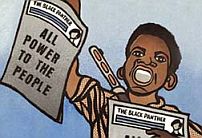 4. The American Sixties. A period in which the relationship between music and social movements was clear, limpid, crystalline, "everything was illuminated". 4. The American Sixties. A period in which the relationship between music and social movements was clear, limpid, crystalline, "everything was illuminated".
When a death squad of the Chicago police murdered Black Panther leader Fred Hampton in his bed, photographs of the murder scene showed a stack of records on the bedroom's floor. Covers were soaked with blood and brain matter. One of the records is Eric Dolphy's Out To Lunch. This picture alone is worth a hundred essays like Philippe Carles' and Jean-Louis Comolli's Free Jazz / Black Power. Music and politics, jam-sessions and Black Power, the movement and the jazz players... They were all part of a single, vast collective expression. The music's emotional tone, the titles of records and compositions, the statements by the artists, the benefit soirées for the Black cause, jazz taken as an example of revolutionary Black culture in the speeches of leaders like Malcolm X or Stokely Carmichael... Everything pointed at that symbiosis, that all-being-one.
The "new thing" would pay for that relationship. The murders of Malcolm X and Martin Luther King, the savage repression of the Panthers, the ghettos flooded with "federal heroin"... It is unlikely that a cultural current can grow or even survive if the social ferments that used to feed it are repressed, nay, annihilated. In Chile, after the 1973 coup, the whole folk music scene disappeared all at once, for obvious reasions. Musicians were all in the common graves (e.g. Victor Jara) or in exile (e.g. Inti Illimani and Quilapayun).
An exile, a new Diaspora, took also place in the milieux of avantgarde jazz. Several artists moved to Europe, where the ferment was still going on. Not only for that reason, but also thanks to the growth of local, non-derivative scenes, from then on jazz (at least a certain kind of jazz) ceased to be American, and became an European affair.
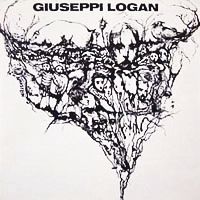 5. The folks at Abraxas/Goodfellas got in touch with me and said: - You wrote a sort of novel on Free Jazz, we own the rights of the ESP catalogue, why don't you edit a compilation, a sampler, something, why don't you think up something, and write something? 5. The folks at Abraxas/Goodfellas got in touch with me and said: - You wrote a sort of novel on Free Jazz, we own the rights of the ESP catalogue, why don't you edit a compilation, a sampler, something, why don't you think up something, and write something?
ESP, New York City. "You never heard such sounds in your life". Founded in 1964, it was the most emblematic record label of the "new thing", more than Impulse! ever was. Impulse! released just a handful (albeit a crucial one) of albums. ESP released dozens of extremist stuff by musicians such as Giuseppi "Whatever-happened-to-him" Logan, Milford Graves, Sunny Murray, the unfailing Albert Ayler, several records by Sun Ra, and many more items, a bonanza of material. What should I have said? I said: yeah!
A sampler, a two-cd sampler, something. Mince and chop up and remix, introduce the music in a non-professorial way. Create stereograms for the ears, allow the people to hear the future in those old fuming improvisations, those crazy concerts with hunting horns. Let the people hear through the chaos, hear Punk, metal, Detroit Techno and Drum'n'Bass break-beats. Don't be philologically correct, be as much heretic as the music you're celebrating used to be. "Jazzophiles" already know that music after all, don't they? They aren't our target. This is Something Else!, as Ornette put it long ago. It's a guerrilla blitz aimed at surprising those who don't know jazz and are prisoners of stereotypes and yet would appreciate certain "acid" sounds and iconoclastic riots, if we secretly loaded them on their iPods. And then, amidst the chaos, you throw scorching, contradictory excerpts of famous speeches by Malcolm and MLK, as well as songs from the freedom movement, words weaving carpets of burning charcoal. At last, write a text. Not only a few liner notes: a text giving the idea of the work you've done, the choices you've made, and the weight of the axe in the bricoleur's hand.
Besides the basic information on the tracks, I've decided not to spend too many words on the biographies and work of the artists. This is a sampler, a remix, an invitation, not a critical edition. Moreover, I'm neither a critic nor an "expert". I'm a storyteller. I'm a strolling minstrel. I'm an African griot. I'm the rooster playing the lute in Walt Disney's Robin Hood. I've limited myself to a few considerations.
6. Part of the backbone of this collection consists of missing persons, forgotten names, artists who took to the bush long ago and now stand on the shady edge. Squeeze your eyes and you'll see them. The history of jazz is made up of (many) disappearances, (unusual) reappearances, and stories taking place underground. Sonny Simmons and Henry Grimes reappeared after twenty or thirty years and asked: "Where did we leave off?". Sunny Murray plods along in Paris, loaded with cymbals and drums, playing gigs in front of twenty persons at best. Milford Graves, the explorer of percussion, teaches music therapy a long way from the limelight (not that he ever got so close...) And how many more ended up in the stomach of a shark, how many sleep in the street wrapped up in newspapers, how many are locked up someplace, where we can't hear them screaming? It's the lost patrol of daring music.
The case of Giuseppi Logan is notorious, there's even a theatrical monologue, The Disappearance Of Giuseppi Logan, written by Guido Michelone. Logan is the quintessential missing artist, he's the subject of an endless episode of Missing, broadcast on the frequencies of word-of-mouth. We all lost his trail. The last sighting was in the late Seventies (or maybe the early Eighties), in a New York club called Ali's Alley, owned by drummer Rashied Ali. While Ali was playing, a dirty, scruffy, ragged bum turned up in the club. Very long beard, empty eyes. Somebody whispered: "You see that guy? He's Giuseppi Logan". I found this story on a newsgroup, rec.music.bluenote. It was a comment dated November 22, 1996. This testimony is consistent with that of Milford Graves. In a 2003 interview, the drummer said: "I last saw him in the Seventies and he wasn’t in good shape. He was in the streets. He is a question mark whether he is still alive." Graves, however, reported a more recent sighting: "Somebody spotted him in Harlem, in a hotel on 125th Street". Did somebody go seek him out? I don't know, and the mystery remains.
And what about Marzette Watts? Whatever happened to him? In the Seventies he had made a space to play out of the former ESP office in Cooper Square. It's all darkness after that. The XXI° century idiot savant (i.e. Google, according to Stephen King) can't find recent news about him.
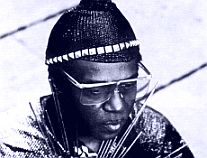 7. And then there are the famous names. 7. And then there are the famous names.
Albert Ayler. Ghosts and Spirits are renowned tunes. At that time, their most impressive feature was a non-dialectical, unpredictable (intellectuals would say "rhizomatic") relationship between catchy themes and boundless improvisation. Improvisation was not "based" on the theme, and it wasn't a mere "deviation" from the theme either. On the contrary, the theme was just one of the many potential articulations of improvisation. It was impossible to predict how and when the musicians would return to the theme, supposing that they had started from it. In the apparent confusion of sounds, you'd go round the corner and there it was, the theme, not farther than the end of your nose, completely unexpected. In the following years, our ears have heard all kinds of sounds, any possible genre and sub-genre of aleatory music, fractal break-beats and clashing loops. Strange to say, now the most "perturbing" aspect of Ayler's music is the timbre of his sax. It sounds... "wrong". It's intentionally strident and, at the same time, it is "toyish", "playthingy". At times it makes a gurgling noise, as though there were water inside - hot, fumigant water.
Ornette Coleman. What more can be said? There's a Karakorum of words about him. Crampons, ice axe, ropes and nails: it's up to you. How peculiar that the timbre of Ornette's sax [Ornette Coleman is like Fidel Castro, people never call him by his surname], notoriously made of plastic, sounds less "toyish" than Ayler's. With the exception of Sun Ra, Ornette is the "new thing" jazz player who had more influence on other musical scenes, even more than Coltrane. The latter was oft-mentioned by pop and rock musicians, but they usually made references to the "classic" quartet period, up to A Love Supreme. This is the 1962 Town Hall concert which saw the debut of Ornette's string quartet, but I selected The Ark 'cause it's better suited to the sampler, it's more "representative". It lasts more than 23 minutes, I obviously used an extract.
Sun Ra. I included more than one tune by the cosmic shaman. Some are small doses, they're pills, nay, they're capsules. Space capsules. An earthly, "endoplanetarian" exoticism/orientalism loses gravity and ascends towards heaven, leaving the orbit, floating away in the void. Radio waves bring us voices and cheers. Even with feet in the air, this saturnal jazz is faithful to its roots. Like the Exodus or the Resurrection, the space trip is a path of liberation told in allegorical form. Those were the years of the "interstellar" (and posthumous) Coltrane and, on the other coast of the States, some were brooding over an "esoplanetarian" project called The Jefferson Starship Blows Against The Empire.
Then there's the Free Music Quintet, which is something else, it's Europe, it marks the beginning of another story. White people and the old continent were being possessed by radical improvisation. The Black Diaspora had gone very far indeed.
8. Not long ago, talking about Coltrane's The Olatunji Concert in an interview, I said: "Before you decide whether you like it or not, listen to it three times. The first time as a mere background while you're doing something else (it's not very good for sex though). The second time, listen to it attentively. The third time, listen to it with earphones as you're walking the streets of your town. Find a way to be on a high place with a view during Jimmy Garrison's bass solo opening My Favorite Things."
The tips are still valid. Garrison's solo is not on this compilation, but there's a lot of peak moments. Make sure that the third listening be an initiatory trip highwards, an ascension to the peak, the crown, the top, the tower, the plateau, the skyscraper roof, any high place with a view will do. Look down, and inebriate yourself with the world all around. You're discovering the wonders of the old new thing.
Wu Ming 1, November 2005
Wu Ming 1 is a member of Wu Ming, a collective of writers. He is the author of New Thing (Einaudi, Turin 2004 - Métailié, Paris 2007). |